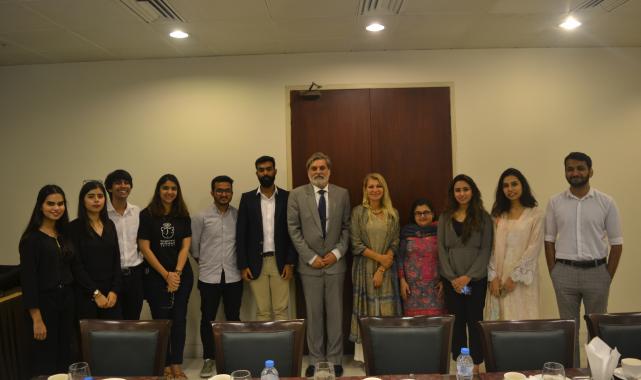
United Nations Office of Drugs and Crime (UNODC) conducted a session with LUMS Model United Nations (LUMUN) on September 15, 2018. LUMS Model United Nations became the very first conference to enter into an official partnership with United Nations on April 18, 2018. Following this, LUMUN was approached by UNODC for an affiliation which would include several opportunities that would open avenues for the youth of the country to play a greater role in bringing about tangible and concrete, positive changes for Pakistan.
The LUMUN Core Team met with two representatives of the UNODC Pakistan office at the session, the Criminal Justice Advisor, Johaida Hanano and the Training Management Officer, Aftab Shuaib. Both these representatives addressed and provided insight to the members of the society regarding very pertinent issues including the United Nations Convention on Corruption (UNCAC) and the Education for Justice Initiative.
Johaida Hanano talked to the society about the functions and role of the UNODC in Pakistan and about the goals and the implementation of the UNCAC. The UNODC focuses on drug control, criminal justice, and terrorism prevention; the second category is further divided into organised crime and corruption and economic crime. The last facet is dealt with by the UNCAC. The UNCAC is also the only global, legally binding framework to combat corruption and it covers many different forms of corruptions, such as trading in influence, illicit enrichment and various acts of corruption in the private sector. The convention has 186 parties to it and deals with aspects like preventive measures, criminalisation and law, international cooperation, asset recovery, and information exchange etc. The UNCAC also has an Implementation Review Mechanism (IRM) which is an inter-governmental peer-monitoring process whereby each state party is reviewed by two peers.
Following this, Aftab Shuaib addressed the Society about the Education for Justice Initiative. He emphasised the importance of education and highlighted that the UNODC works to disseminate educational material in the country, provide academic tools and resources and hold workshops, conferences, and symposiums. It focuses on education on all levels, primary, secondary and tertiary. He also focused on the benefits of UNODC and Model UN collaboration. This affiliation will make it easier to attain several goals such as ensuring safe, positive and secure learning environments, integrating rule of law and crime prevention in education systems and building effective youth involvement in social and economic policies.
The talk holistically proved to be extremely beneficial on multiple levels. It not only allowed the LUMUN members to gain first-hand insight into the mandate and goals of the UNODC but also helped them understand the implications of these issues pertaining specifically to Pakistan.








